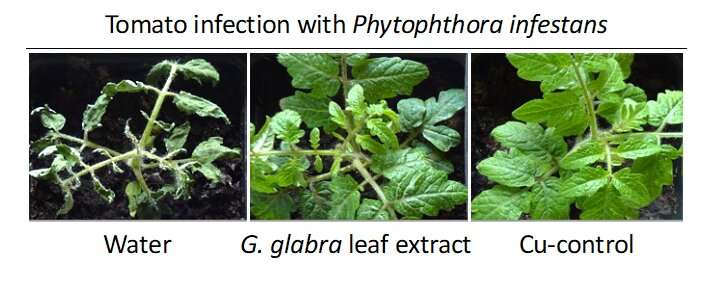Licorice leaf extract is a promising plant protectant for conventional and organic agriculture

Pesticides have proven effective in protecting crop yield against plant pathogens, but the environmental detriment to nontarget organisms has prompted a tug-of-war between organic and conventional agriculture practices. This poses the question: How can growers and farmers sustain their business in the safest, most responsible way?
While copper, a naturally occurring pesticide, has been widely implemented in response to this question, finding additional biocontrol methods will reduce copper use and further contribute to sustainable solutions.
A study by Sophie Hermann and colleagues, recently published in Plant Disease, reveals another promising biocontrol alternative. Since the licorice plant has broadly benefitted other industries, the researchers tested its impact as a pesticide—discovering that the licorice leaf extract is a potent bactericide and fungicide.
Corresponding author Adam Schikora explains, “In the pharmaceutical, cosmetic, and food industries, the interest focuses primarily on roots of the licorice plant. The leaves and upper parts of the plant are byproducts and often neglected. However, we show their potential as a base for plant protection products, which may be utilized in both conventional and organic agriculture systems.”
Using plant efficacy trials, the researchers tested the impact of licorice leaf extract on the virulence of common, highly pathogenic bacteria in the model plant Arabidopsis and in tomato. Their results demonstrate that licorice leaf extract modulates plant immune responses to pathogens, involving both salicylic acid and ethylene-based responses. The extract also acts against a particular late blight-causing oomycete that is resistant to metalaxyl, the active ingredient in several synthetic fungicides.
Altogether, these exciting results offer a potential way to naturally control plant diseases caused by a vast range of pathogens, including bacteria and oomycetes. Schikora comments, “The possibility to develop biological alternatives for plant protection that are sustainable and employ otherwise unused materials will not only help in our agricultural approaches, but also support local, circular economies.”
Further studies can help extract every bit of potential that licorice leaf extract holds as an alternative plant protection measure in the production of economically important crops.
More information:
Sophie Hermann et al, Biocontrol of Plant Diseases Using Glycyrrhiza glabra Leaf Extract, Plant Disease (2022). DOI: 10.1094/PDIS-12-21-2813-RE
Provided by
American Phytopathological Society
Citation:
Licorice leaf extract is a promising plant protectant for conventional and organic agriculture (2023, February 8)
retrieved 8 February 2023
from https://phys.org/news/2023-02-licorice-leaf-conventional-agriculture.html
This document is subject to copyright. Apart from any fair dealing for the purpose of private study or research, no
part may be reproduced without the written permission. The content is provided for information purposes only.
For all the latest Science News Click Here
For the latest news and updates, follow us on Google News.

